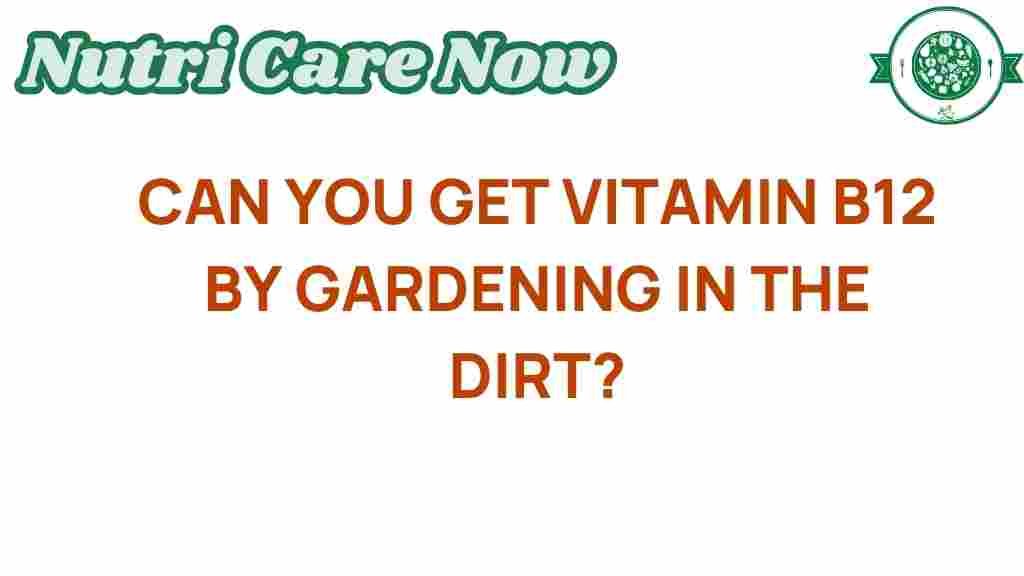Unearthing Vitamin B12: Can Gardening Provide This Essential Nutrient?
Vitamin B12, also known as cobalamin, is an essential nutrient that plays a crucial role in maintaining our overall health. It is vital for nerve function, red blood cell formation, and DNA synthesis. Yet, many people may not realize that gardening can indirectly support our intake of Vitamin B12 through the cultivation of healthy soil and nutrient-rich plants. In this article, we will explore the connection between gardening, nutrition, and Vitamin B12 while highlighting the importance of soil health and dietary sources of this vital vitamin.
The Importance of Vitamin B12 in Our Diet
Vitamin B12 is a water-soluble vitamin that is primarily found in animal products. It is essential for various bodily functions, including:
- Red blood cell production: Prevents anemia and promotes healthy circulation.
- Nerve health: Supports the maintenance of the myelin sheath, which protects nerves.
- DNA synthesis: Vital for proper cell division and replication.
- Energy metabolism: Plays a role in converting food into energy.
Deficiency in Vitamin B12 can lead to serious health issues, including neurological disorders, anemia, and fatigue. Therefore, it is essential to ensure that we are getting enough of this nutrient in our diets.
Dietary Sources of Vitamin B12
Vitamin B12 is primarily found in animal products, making it a challenge for vegetarians and vegans to obtain sufficient amounts. Some of the best dietary sources include:
- Meat (beef, pork, lamb)
- Poultry (chicken, turkey)
- Fish (salmon, tuna, sardines)
- Dairy products (milk, cheese, yogurt)
- Eggs
- Fortified foods (cereals, plant-based milk)
For those who follow a plant-based diet, it is crucial to consider fortified foods or supplements to meet their Vitamin B12 needs.
The Role of Gardening in Nutrition
Gardening can play a significant role in enhancing our nutrition, particularly when it comes to the cultivation of fruits, vegetables, and herbs that provide numerous vitamins and micronutrients. While gardening itself does not produce Vitamin B12, it promotes a holistic approach to health through:
- **Soil Health:** Healthy soil is rich in organic matter and microorganisms that help plants thrive, leading to richer nutrient profiles in the produce.
- **Increased Consumption of Fresh Produce:** Growing your own food encourages the consumption of a variety of nutrient-dense fruits and vegetables.
- **Sustainable Practices:** Gardening promotes sustainable eating habits, which can lead to better overall health.
How to Garden for Optimal Nutrition
Here’s a step-by-step guide to gardening in a way that optimizes nutrition, helping you grow healthy plants that contribute to your overall dietary intake.
Step 1: Choose the Right Plants
Select a variety of fruits and vegetables that are rich in vitamins and micronutrients. Some excellent choices include:
- Leafy Greens: Spinach, kale, and Swiss chard are rich in vitamins A, C, and K.
- Cruciferous Vegetables: Broccoli and Brussels sprouts provide essential nutrients and antioxidants.
- Root Vegetables: Carrots and beets are high in beta-carotene and fiber.
- Herbs: Basil, parsley, and cilantro can enhance the flavor and nutritional value of meals.
Step 2: Focus on Soil Health
The health of your soil directly impacts the nutritional quality of your plants. Here are some tips for improving soil health:
- Add Organic Matter: Incorporate compost or well-rotted manure to enrich the soil with nutrients.
- Practice Crop Rotation: Rotating crops helps prevent nutrient depletion and reduces pest problems.
- Test Soil pH: Use a soil test kit to determine pH levels and amend as necessary for optimal plant growth.
Step 3: Use Companion Planting Techniques
Companion planting involves growing different plants in proximity for mutual benefits, such as pest control and improved nutrient uptake. Some effective combinations include:
- Tomatoes with basil
- Carrots with onions
- Beans with corn
Step 4: Harvest at the Right Time
Timing your harvest is crucial for maximizing the nutrient content of your produce. Generally, fruits and vegetables should be harvested at their peak ripeness for the best flavor and nutritional value.
Step 5: Preserve and Prepare Properly
The way you prepare and preserve your garden harvest can also impact nutrient retention. Consider these methods:
- Light Cooking: Steaming or sautéing vegetables can help retain vitamins compared to boiling.
- Freezing: Freezing vegetables shortly after harvest preserves their nutrients.
- Fermentation: This process not only preserves food but also enhances its nutritional profile.
Troubleshooting Common Gardening Issues
Even the best gardeners encounter challenges. Here are some common issues and how to address them:
- Pests: Use natural pest control methods, such as insecticidal soap or introducing beneficial insects.
- Nutrient Deficiencies: If plants show signs of nutrient deficiency (like yellowing leaves), consider soil testing and appropriate amendments.
- Poor Growth: Ensure plants are receiving adequate sunlight, water, and space for optimal growth.
The Health Benefits of Gardening
Gardening not only contributes to nutrition through the production of healthy food but also offers numerous health benefits, including:
- Physical Exercise: Gardening involves various physical activities, helping improve fitness and cardiovascular health.
- Mental Well-being: Spending time outdoors and nurturing plants can reduce stress and promote mental clarity.
- Social Interaction: Community gardens can foster relationships and social networks, enhancing emotional health.
Conclusion
While gardening may not directly provide Vitamin B12, it plays a significant role in supporting a healthy diet and overall well-being. By understanding the importance of soil health and selecting nutrient-rich plants, gardeners can enhance their nutrition and promote sustainable eating habits. Remember, for those who do not consume animal products, it is essential to seek out fortified foods or supplements to ensure adequate Vitamin B12 intake. Gardening can be a rewarding journey that not only nourishes the body but also enriches the mind and soul.
For more information on nutrition and gardening, check out this helpful resource.
Finally, for additional tips on maintaining soil health, visit this external link.
This article is in the category Health and created by NutriCareNow Team
